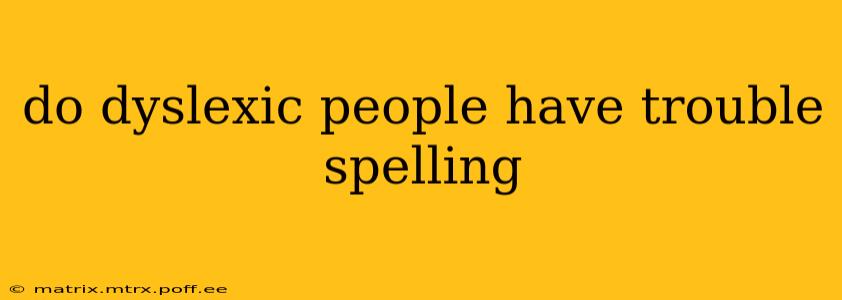Do Dyslexic People Have Trouble Spelling?
Yes, many individuals with dyslexia experience difficulties with spelling. This is a common characteristic, although the severity varies significantly from person to person. It's not a defining feature of all dyslexic individuals, and some may have relatively minor spelling challenges, while others face significant obstacles. Understanding the nuances behind this common question requires a closer look at the nature of dyslexia itself.
What is Dyslexia?
Dyslexia is a neurobiological learning difference that primarily affects reading and related language skills. It's not a matter of intelligence or effort; instead, it stems from differences in how the brain processes written and spoken language. These differences can manifest in various ways, impacting reading fluency, decoding words, spelling, and even writing. While spelling challenges are common, it's crucial to understand that dyslexia is a complex condition with a range of presentations.
How Does Dyslexia Affect Spelling?
The difficulties with spelling that many dyslexic individuals face are directly related to the core challenges of dyslexia. These include:
-
Phoneme-grapheme correspondence: Dyslexia can affect the ability to connect the sounds (phonemes) of spoken language to the letters (graphemes) that represent them in writing. This makes it difficult to accurately spell words based on their sounds.
-
Working memory: Spelling often requires holding multiple pieces of information in mind simultaneously—the beginning of the word, the sounds, the spelling rules, and the overall structure. Difficulties with working memory can make this task challenging.
-
Visual processing: Some aspects of spelling involve visual memory and the ability to recognize patterns in letters and words. Visual processing challenges can impact a person's ability to accurately remember and reproduce spellings.
-
Phonological processing: The ability to process and manipulate sounds in words is crucial for spelling. Weaknesses in phonological processing can lead to errors in sound-based spelling.
What are Some Common Spelling Mistakes in Dyslexic Individuals?
While the specific errors vary, common spelling challenges for individuals with dyslexia include:
-
Phonetic spelling: Spelling words based on how they sound, even if it deviates from the correct spelling (e.g., writing "rite" for "right").
-
Letter reversals: Reversing letters within words (e.g., "was" written as "saw").
-
Letter omissions or additions: Leaving out or adding letters (e.g., "cat" written as "akt" or "catt").
-
Inconsistency: Spelling the same word differently at different times.
Can Dyslexia Affect Spelling in Adults?
Yes, dyslexia affects individuals throughout their lives. While some individuals develop strategies to compensate for their spelling challenges, the underlying difficulties often persist into adulthood.
Are There Strategies to Help With Spelling Difficulties in Dyslexic Individuals?
Absolutely! Various strategies and interventions can significantly improve spelling skills in individuals with dyslexia. These often include:
-
Multisensory techniques: Engaging multiple senses (visual, auditory, kinesthetic) during spelling practice.
-
Technology: Utilizing assistive technologies such as text-to-speech software and spell checkers.
-
Explicit instruction in phonics: Focus on teaching the relationships between sounds and letters.
-
Memory strategies: Techniques for memorizing spellings of difficult words.
-
Individualized education programs (IEPs): Tailored learning plans designed to address the specific needs of the individual.
In conclusion, while spelling challenges are frequently associated with dyslexia, it's crucial to remember that dyslexia is a diverse condition. Understanding the underlying cognitive processes and employing appropriate strategies can significantly improve spelling abilities and empower individuals with dyslexia to overcome these challenges.
